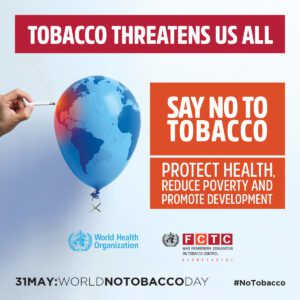
Contact our PIO directly to share health news.

770.339.4260
Tobacco Threatens Us All — 2017 World NO Tobacco Day

The World Health Organization is highlighting how tobacco threatens the development of nations worldwide, and is calling on governments to implement strong tobacco control measures. These include banning marketing and advertising of tobacco, promoting plain packaging of tobacco products, raising excise taxes, and making indoor public places and workplaces smoke-free.
Tobacco’s health and economic costs
- Tobacco use kills more than 7 million people every year and costs households and governments over 1.4 trillion US dollars through healthcare cost and lost productivity.
- All countries have committed to the2030 Agenda for Sustainable Development, which aims to strengthen universal peace and eradicate poverty. Key elements of this agenda include implementing the WHO Framework Convention on Tobacco Control, and by 2030 reducing by one third premature death from noncommunicable diseases (NCDs) related to tobacco use, including heart and lung diseases, cancer, and diabetes.
Tobacco scars the environment
- Tobacco waste contains over 7000 toxic chemicals that poison the environment, including human carcinogens.
- Tobacco smoke emissions contribute thousands of tons of human carcinogens, toxicants, and greenhouse gases to the environment. And tobacco waste is the largest type of litter by count globally.
- Up to 10 billion of the 15 billion cigarettes sold daily are disposed into the environment.
- Cigarette butts account for 30–40% of all items collected in coastal and urban clean-ups.
Tobacco threatens women, children, and livelihood
- Many studies have shown that in the poorest households, spending on tobacco products often represents more than 10% of total household expenditure – meaning less money for food, education, and healthcare.
- Women: 60%–70% of tobacco farm workers are women, putting them in close contact with often hazardous chemicals.
- Children and education: Tobacco farming stops children attending school. 10%–14% of children from tobacco-growing families miss class because of working in tobacco fields.
- Health: Tobacco contributes to 16% of all noncommunicable diseases (NCDs) deaths.
Taxation: a powerful tobacco control tool
- Governments collect nearly US$ 270 billion in tobacco excise tax revenues each year, but this could increase by over 50%, generating an additional US$ 141 billion, simply from raising taxes on cigarettes by just US$ 0.80 per pack (equivalent to one international dollar) in all countries.
- Increased tobacco taxation revenues will strengthen domestic resource mobilization, creating the fiscal space needed for countries to meet development priorities under the 2030 Agenda.
Helpful Links:
- News Release World No Tobacco Day
- Tobacco FactSheet
- Take the quiz! How much do you know about Tobacco’s impact?
Information provided by World Health Organization
Follow us on Facebook and Twitter to stay informed about World NO Tobacco Day!
Contact our PIO directly to share health news.



